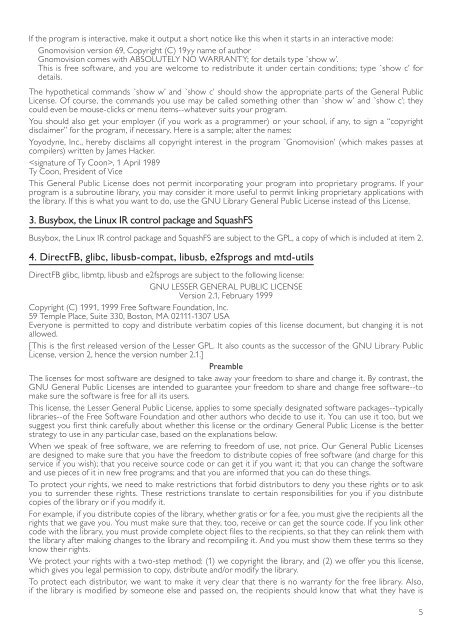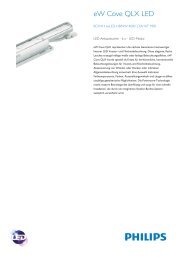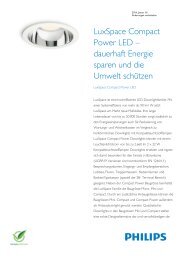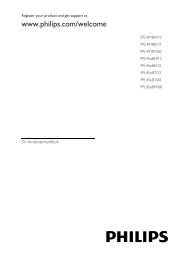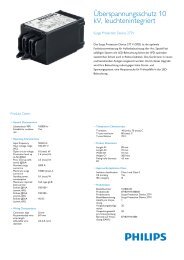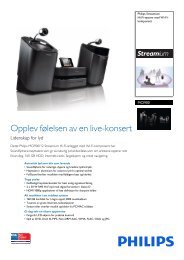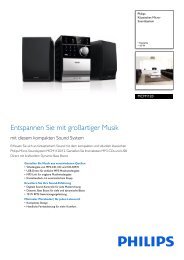ec declaration of conformity - Philips
ec declaration of conformity - Philips
ec declaration of conformity - Philips
You also want an ePaper? Increase the reach of your titles
YUMPU automatically turns print PDFs into web optimized ePapers that Google loves.
If the program is interactive, make it output a short notice like this when it starts in an interactive mode:<br />
Gnomovision version 69, Copyright (C) 19yy name <strong>of</strong> author<br />
Gnomovision comes with ABSOLUTELY NO WARRANTY; for details type `show w’.<br />
This is free s<strong>of</strong>tware, and you are welcome to redistribute it under certain conditions; type `show c’ for<br />
details.<br />
The hypothetical commands `show w’ and `show c’ should show the appropriate parts <strong>of</strong> the General Public<br />
License. Of course, the commands you use may be called something other than `show w’ and `show c’; they<br />
could even be mouse-clicks or menu items--whatever suits your program.<br />
You should also get your employer (if you work as a programmer) or your school, if any, to sign a “copyright<br />
disclaimer” for the program, if n<strong>ec</strong>essary. Here is a sample; alter the names:<br />
Yoyodyne, Inc., hereby disclaims all copyright interest in the program `Gnomovision’ (which makes passes at<br />
compilers) written by James Hacker.<br />
, 1 April 1989<br />
Ty Coon, President <strong>of</strong> Vice<br />
This General Public License does not permit incorporating your program into proprietary programs. If your<br />
program is a subroutine library, you may consider it more useful to permit linking proprietary applications with<br />
the library. If this is what you want to do, use the GNU Library General Public License instead <strong>of</strong> this License.<br />
3. Busybox, the Linux IR control package and SquashFS<br />
Busybox, the Linux IR control package and SquashFS are subj<strong>ec</strong>t to the GPL, a copy <strong>of</strong> which is included at item 2.<br />
4. Dir<strong>ec</strong>tFB, glibc, libusb-compat, libusb, e2fsprogs and mtd-utils<br />
Dir<strong>ec</strong>tFB glibc, libmtp, libusb and e2fsprogs are subj<strong>ec</strong>t to the following license:<br />
GNU LESSER GENERAL PUBLIC LICENSE<br />
Version 2.1, February 1999<br />
Copyright (C) 1991, 1999 Free S<strong>of</strong>tware Foundation, Inc.<br />
59 Temple Place, Suite 330, Boston, MA 02111-1307 USA<br />
Everyone is permitted to copy and distribute verbatim copies <strong>of</strong> this license document, but changing it is not<br />
allowed.<br />
[This is the first released version <strong>of</strong> the Lesser GPL. It also counts as the successor <strong>of</strong> the GNU Library Public<br />
License, version 2, hence the version number 2.1.]<br />
Preamble<br />
The licenses for most s<strong>of</strong>tware are designed to take away your freedom to share and change it. By contrast, the<br />
GNU General Public Licenses are intended to guarantee your freedom to share and change free s<strong>of</strong>tware--to<br />
make sure the s<strong>of</strong>tware is free for all its users.<br />
This license, the Lesser General Public License, applies to some sp<strong>ec</strong>ially designated s<strong>of</strong>tware packages--typically<br />
libraries--<strong>of</strong> the Free S<strong>of</strong>tware Foundation and other authors who d<strong>ec</strong>ide to use it. You can use it too, but we<br />
suggest you first think carefully about whether this license or the ordinary General Public License is the better<br />
strategy to use in any particular case, based on the explanations below.<br />
When we speak <strong>of</strong> free s<strong>of</strong>tware, we are referring to freedom <strong>of</strong> use, not price. Our General Public Licenses<br />
are designed to make sure that you have the freedom to distribute copies <strong>of</strong> free s<strong>of</strong>tware (and charge for this<br />
service if you wish); that you r<strong>ec</strong>eive source code or can get it if you want it; that you can change the s<strong>of</strong>tware<br />
and use pi<strong>ec</strong>es <strong>of</strong> it in new free programs; and that you are informed that you can do these things.<br />
To prot<strong>ec</strong>t your rights, we need to make restrictions that forbid distributors to deny you these rights or to ask<br />
you to surrender these rights. These restrictions translate to certain responsibilities for you if you distribute<br />
copies <strong>of</strong> the library or if you modify it.<br />
For example, if you distribute copies <strong>of</strong> the library, whether gratis or for a fee, you must give the r<strong>ec</strong>ipients all the<br />
rights that we gave you. You must make sure that they, too, r<strong>ec</strong>eive or can get the source code. If you link other<br />
code with the library, you must provide complete obj<strong>ec</strong>t files to the r<strong>ec</strong>ipients, so that they can relink them with<br />
the library after making changes to the library and r<strong>ec</strong>ompiling it. And you must show them these terms so they<br />
know their rights.<br />
We prot<strong>ec</strong>t your rights with a two-step method: (1) we copyright the library, and (2) we <strong>of</strong>fer you this license,<br />
which gives you legal permission to copy, distribute and/or modify the library.<br />
To prot<strong>ec</strong>t each distributor, we want to make it very clear that there is no warranty for the free library. Also,<br />
if the library is modified by someone else and passed on, the r<strong>ec</strong>ipients should know that what they have is<br />
5


